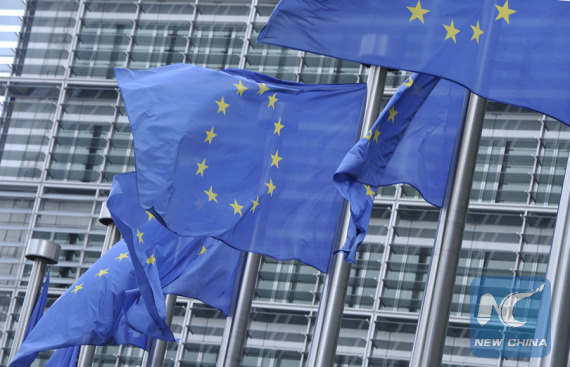
EU headquarters in Brussels, capital of Belgium. (File photo/Xinhua)
While granting China market economy status (MES) will mean win-win results for China and the European Union, refusal to do so could put one of the world's most important trade relationships at risk.
Despite media reports saying the two sides are close to a deal on the issue, there is still strong opposition among some EU policymakers and lawmakers, mainly citing the EU's internal standards for a market economy.
However, either by law or by facts, it shouldn't be a difficult decision to make as to whether to grant China the MES.
The protocols for China's accession to the World Trade Organization (WTO) in 2001 dictate that China will automatically switch over to market economy status when the Surrogate Country approach expires 15 years later.
When the Surrogate Country approach is in effect, a third country or region's prices can be used to assess if a certain country is exporting below market value or dumping.
The approach applicable to China expires on Dec. 11, 2016, according to Article 15 of the accession protocols. This means, by that day, the legal foundation for treating China as a non-market economy is gone. Whether or not China meets the EU's own standard on the MES is irrelevant.
The protocols are the consensus reached between China and other WTO members during the accession negotiation. No signatary party can evade its obligations by citing domestic laws as an excuse. Doing so would be a distortion of rules and deliberate misinterpretation of the WTO protocols.
The EU's refusal to fulfill its obligations could force China to resort to legal litigation under the WTO framework, and economic and trade relations between the two sides could be hurt.
The worst scenario could be an all-out trade war between the two economies, which are key export markets to the other, and the price could be way too high for both sides.
China is the EU's second-biggest trading partner, with daily trade flows of over 1 billion euros (1.13 billion U.S. dollars). Giving China MES will make China-EU trade ties stronger than ever before, given the increasing interdependence between the world's two major economies.
The EU's refusal to recognize China's MES smells of political prejudice and protectionism, which has been on the rise recently as the global economy is battling with a prolonged and slow recovery.
Business insiders fear that the EU's failure to grant China the MES is tantamount to a permit to arbitrarily impose anti-dumping measures against the country.
The EU already has a track record of turning to protectionist measures against Chinese products. Among 73 anti-dumping measures that the EU is currently employing, 56 are targeted at Chinese import.


















































